

By Ray Pride Pride@moviecitynews.com
#TheMaster70mm: Chicago
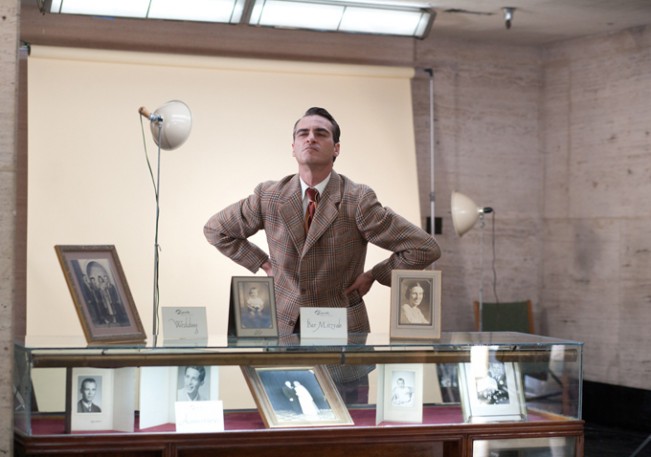 “You’re the bravest boy I’ve ever known,” is one of many memorable, belittling endearments Philip Seymour Hoffman‘s “Master” issues to his singular and ultimate protégé Freddy Quell (Joaquin Phoenix). He’s practically beaming after one of Freddy’s frenzies of violence: “Naughty boy, okay! All right?” There are memorable mouthfuls galore, but will any of them turn out to be an “I drink your milkshake?”
“You’re the bravest boy I’ve ever known,” is one of many memorable, belittling endearments Philip Seymour Hoffman‘s “Master” issues to his singular and ultimate protégé Freddy Quell (Joaquin Phoenix). He’s practically beaming after one of Freddy’s frenzies of violence: “Naughty boy, okay! All right?” There are memorable mouthfuls galore, but will any of them turn out to be an “I drink your milkshake?”
Thursday night’s showing at Chicago’s Music Box Theatre, with all its tickets sold to the public online in less than two hours, was the first screening of The Master available to the general public. (The screening at the Aero Theater in Santa Monica was an unannounced sneak.) Coming before its premiere at Venice and “North American Premiere” at Toronto, should this be considered the world premiere? In any case, the evening, with Paul Thomas Anderson reportedly in the shadows, showed that delicious showmanship in movie presentation is still possible, at least once you have a set of 70mm reels struck and a young, equally cussed producer of great wealth on your side.
A few notes: Anderson’s screenplay of The Master demonstrates a deep concern for its historical inspiration: readers of lore of a certain personality may be amazed by how familiar some details and notions will seem. The movie’s actually sympathetic to the wild hopes and ambitions and simple failings of its Lancaster Dodd, its L. Ron Hubbard-like character who is seldom referred to as anything but “The Master.”
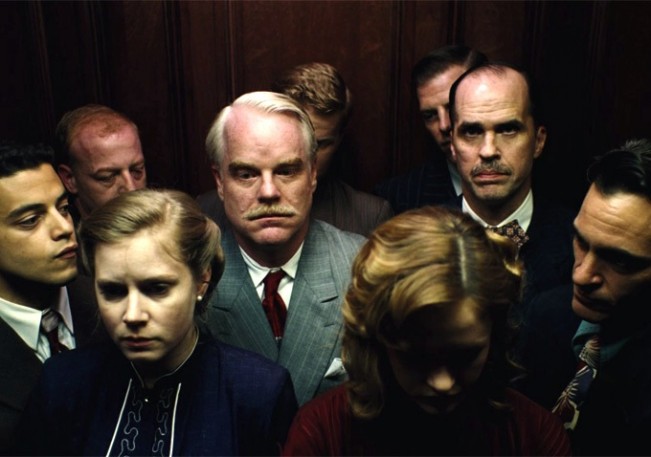 The 70mm frame bursts onto the screen with an image that will recur and persist: a gentle slurry of foam that slicks the emerald and azure sea: the coursing of memory. Warm, embracing, drowning, consuming: memory. Can you control it? Does it control you? As the two and a half hours of mentor-protégé human experiences revolve around the two men’s mano-a-mano, the performances are more physical than traditionally psychological. For instance, Phoenix discovers ever more remarkable ways to sort and mass his mouth and jaw, more than even Rodin found to sculpt the human shoulder at stress. This is a carnival of gestural extremes.
The 70mm frame bursts onto the screen with an image that will recur and persist: a gentle slurry of foam that slicks the emerald and azure sea: the coursing of memory. Warm, embracing, drowning, consuming: memory. Can you control it? Does it control you? As the two and a half hours of mentor-protégé human experiences revolve around the two men’s mano-a-mano, the performances are more physical than traditionally psychological. For instance, Phoenix discovers ever more remarkable ways to sort and mass his mouth and jaw, more than even Rodin found to sculpt the human shoulder at stress. This is a carnival of gestural extremes.
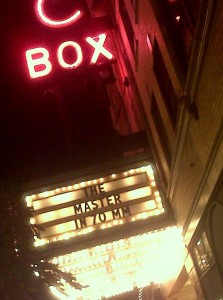 Explanations are pared away; background for “The Cause” that “Master” represents is implied, hardly ever explained. Motivations of secondary characters are elided. There’s hardly a force onscreen beyond Master and Freddy. Amy Adams, as Master’s wife, has three scenes that show her to be yet another sort of master in the emotional equations. (Husband and wife have an especially close morning moment in front of the bathroom mirror that contrasts power and weakness.) There is seething tumult in the control Adams brings to an unexpected peroration that goes something like, “This city is noise. Just noise and bad living. I know this place. I know its rotten secrets.”
Explanations are pared away; background for “The Cause” that “Master” represents is implied, hardly ever explained. Motivations of secondary characters are elided. There’s hardly a force onscreen beyond Master and Freddy. Amy Adams, as Master’s wife, has three scenes that show her to be yet another sort of master in the emotional equations. (Husband and wife have an especially close morning moment in front of the bathroom mirror that contrasts power and weakness.) There is seething tumult in the control Adams brings to an unexpected peroration that goes something like, “This city is noise. Just noise and bad living. I know this place. I know its rotten secrets.”
Rotten secrets are also Master’s obsession, as is believing that man has a higher place than the “vessel” in which we move through our lives. “Man is not an animal,” Master insists in proclamations, “Man is an eternal spirit.” His combat on behalf of “homo sapiens” entire is eventually reduced to wrestling, denying his own urges. And, at each greeting, literally wrestling Freddy himself. Freddy, on the other hand, is simple, rambunctious recklessness. (The pair readily line up as a paragon of simplified ego-vs.-id: Release the Freudians!) Freddy can’t, won’t deny his urges. “I am many things,” Master intones, Hoffman mastering a chaw of marbled hubris, “I am writer, a doctor, a nuclear physicist, a theoretical philosopher. Above all, I am a man. A hopelessly inquisitive Man, just like you.” Who is the greater Man? (And who is a brave boy auteur?)
The trailer for the Chicago screening:









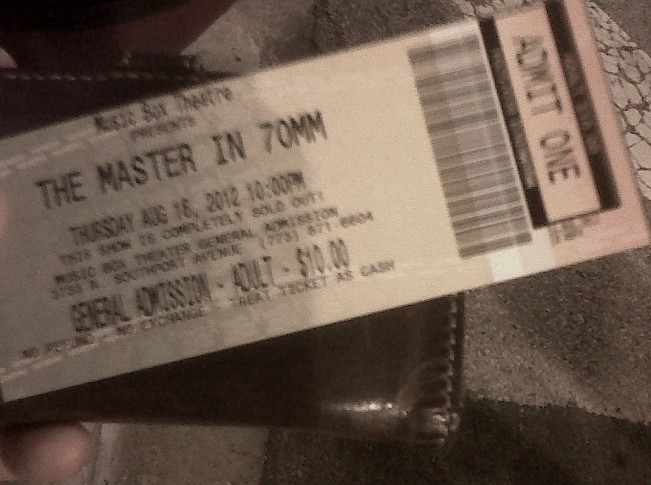
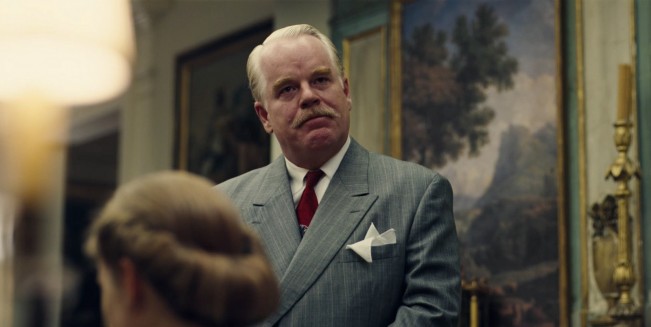





Very jealous. Hopefully it will play in 70mm in the DFW area, though I must admit I just need to see it already (even digitally). I can’t wait much longer.
Chicago Tribune reports 70mm in New York, Los Angeles, San Francisco, Seattle, Boston, DC and Austin with possibility of Minneapolis, Denver and Ann Arbor.
I’d drive to Austin if I could guarantee a great seat.
And a lock of PTA’s hair.